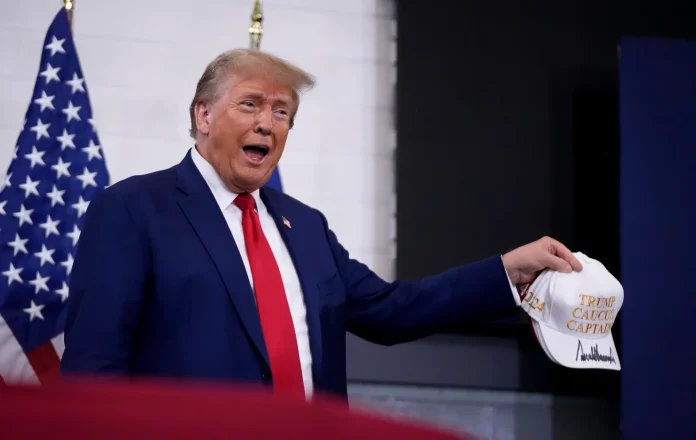Appeals court grills lawyers over gag order in Trump case
Prosecutors with the special counsel’s office and lawyers for Donald Trump faced tough questions from a Washington, D.C., appeals court on Monday about the validity of a limited gag order in Trump’s federal election interference case.
The limited gag order, issued by U.S. District Judge Tanya Chutkan but currently on hold pending appeal, bars Trump from making or reposting statements that “publicly target” special counsel Jack Smith and his staff, as well as the judge’s staff and other D.C. district court personnel.
The appeals court did not rule immediately on whether the limited gag order should remain in effect.
Trump pleaded not guilty in August to charges of orchestrating a “criminal scheme” to overturn the 2020 election results by using a group of so-called “fake electors,” directing the Justice Department to conduct “bogus election crime investigations,” attempting to persuade the vice president to “change the election outcome,” and spreading false allegations of a rigged election while the Jan. 6 riot unfolded – all in a bid to undermine democracy and stay in power.
The former president has rejected all the allegations and condemned the charges as “a political witch hunt.”
Chutkan imposed the limited gag order last month after Trump made remarks and online posts that called Smith “insane” and a “bully.”
At Monday’s hearing, Trump’s lawyer John Sauer argued that the limited gag order against Trump was “unprecedented” and set “a dangerous precedent for future limits on core political speech.”
He said that the government had no authority to decide what was – what topics were relevant or irrelevant to discuss in a political campaign. “The gag order does both of those things,” he said.
The appeals court judges asked Sauer if he would have a different view if the gag order was applied to Trump a year ago – seeking to understand if the closeness to the 2024 presidential election would affect their position on the gag order’s constitutionality.
Sauer said he would still oppose the gag order as unconstitutional and that Trump’s criticisms of Smith and the case were protected political speech.
One of the judges then asked if the defense was claiming that Trump was “above the law,” to which Sauer said they were not.
The judge then pressed Sauer on whether he thought courts could ever have a sufficient interest in safeguarding the integrity of a trial that they could impose such a gag order – and cited several examples of Supreme Court precedent.
Sauer, however, maintained that the current situation was unique.
Sauer also contended that a gag order could only be justified by an “imminent” threat and not a hypothetical one – which Judge Bradley Garcia suggested contradicted precedent.
Special counsel’s appellate lawyer Cecil VanDevender defended the restrictions on making personal attacks against Smith as supported by Supreme Court precedent – but judges challenged him to explain how that did not infringe on Trump’s First Amendment rights, posing a hypothetical scenario in which Trump was on a debate stage where his rivals could bring up various specific issues related to the prosecutions he faced, and asking if he should be prevented from responding to them.
The judge asked VanDevender if Trump would have to speak “Ms. Manners” while everyone on the stage was attacking him.
VanDevender said the existing order would allow Trump to say the prosecution was politically motivated and call the Justice Department corrupt, but that Trump should be prohibited from even naming the prosecutors in the case – a stance that met with strong resistance from judges as they presented him with several hypothetical scenarios that could challenge the gag order.
The judges questioned how Trump could react to Barr’s 60 Minutes interview, where he criticized Trump for his role in the Jan. 6 riot, without violating the gag order.
VanDevender proposed that Trump could deny Barr’s claims, but he had to refrain from using any “inflammatory language” or challenging Barr’s credibility in a manner that could prejudice the potential jurors.
Another judge wondered if calling someone a “slimy liar” was inflammatory.
VanDevender agreed that it was inflammatory, and added that Trump could only state that he “disagreed” with a witness’ statement regarding Jan. 6, not that they “lied.”
One of the judges emphasized the importance of preserving the criminal trial process and its integrity and truth-finding function, as the panel deliberated on its ruling.





